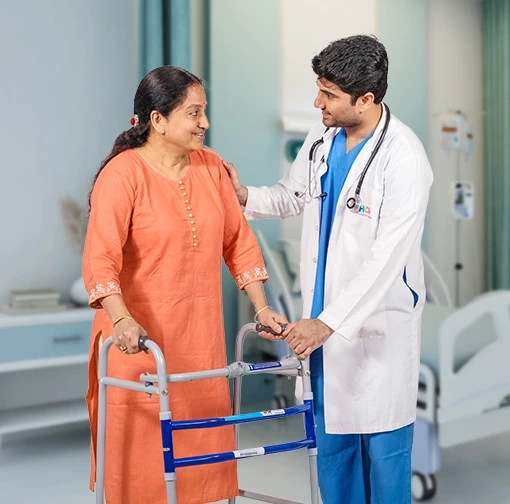HCG Home Healthcare is a unique initiative, which aims to provide primary home health care services at home.
HCG Hospitals is a trusted super-speciality hospital in India. Equipped with high-end diagnostic and treatment facilities and a robust team of healthcare specialists, HCG Hospitals offers a wide range of medical services across various disciplines. Recognised by the National Accreditation Board for Hospitals and Healthcare Providers (NABH), this multispeciality hospital strives to deliver the highest quality treatment and care to its patients.
Patient treated every year
Cardiac Procedures
Neuro Surgery
Ortho and Spine Surgeries
Critical care treatments
Comprehensive care unit across India for Cancer and Tertiary Care Hospital
Highly Experienced Doctor
Years of Excellence

(Prof.) Dr. Narendra Hiregoudar
Consultant Interventional Cardiology
Interventional Cardiology,
HCG Suchirayu Hospital, Hubli,
General Surgery, Laparoscopic Surgery
General Surgery,Laparoscopic Surgery,
HCG Suchirayu Hospital, Hubli,
Cardiothoracic and Vascular Surgery
Cardiothoracic and Vascular Surgery,
HCG Hospitals, Ahmedabad,HCG Hospitals, Bhavnagar,
Consultant Orthopaedic, Joint Replacement, and Arthroscopy Surgeon
Arthroscopy Surgery,
HCG Hospitals, Rajkot,
Ear, Nose, and Throat (ENT)
Best ENT Hospitals and ENT Specialists in Rajkot,
HCG Hospitals, Ahmedabad,
Consultant Neuro and Spine surgeon
Best Neuro Care Hospitals and Neurosurgeons in India,Best Spine Care Hospitals and Spine Surgeons in India,
HCG Hospitals, Bhavnagar,
Dr. Keyur Pravinchandra Rathod
Consultant General Surgery
General Surgery,
HCG Hospitals, Bhavnagar,
Consultant Anaesthesiology & Intensive Care,
Anaesthesiology,Critical Care Medicine,
HCG Suchirayu Hospital, Hubli,
Consultant Oral & Maxillofacial Surgeon
Oral & Maxillofacial Surgery,
HCG Suchirayu Hospital, Hubli,
Dr. Priyank Chandraprakash Gupta
Senior Consultant Surgeon in Joint Replacement, Sports Injury, and Arthroscopy
Arthroscopy and Sports Medicine,
HCG Hospitals, Ahmedabad,
General Surgery and laproscopic surgery
General Surgery,Laparoscopic Surgery,
HCG Suchirayu Hospital, Hubli,
Medical Gastroenterology and Endoscopy
Medical Gastroentrology,Endoscopy,
HCG Suchirayu Hospital, Hubli,
Senior Consultant Cardiothoracic and Vascular Surgeon
Cardiothoracic and Vascular Surgery,
HCG Suchirayu Hospital, Hubli,
Vascular & Interventional Radiology
Endovascular & Interventional Radiology,
HCG Hospitals, Ahmedabad,
Consultant Endovasular & Interventional Radiologist
Endovascular & Interventional Radiology,
HCG Suchirayu Hospital, Hubli,
Consultant - General Surgery & Advance Laparoscopic Surgery
GI and Laparoscopic Surgery,
HCG Hospitals, Rajkot,
As a leading super-speciality hospital, it is not just your treatment that we focus on. We leave no stone unturned to improve your treatment experience through patient-friendly care facilities and support services.
View AllChoose from a Range of Health Checkup Packages
Diabetic Screening Package
Rs. 1,600/-
Kidney/ Renal Screening Package
Rs. 1,100/-
Arthritis Screening Package
Rs. 1,400/-
Heart Screening Package
Rs. 1,900/-
Obesity Screening Package
Rs. 1,900/-
General Health Checkup
Rs. 1,600/-
Diabetic Health Checkup
Rs. 2,100/-
Preventive Heart Checkup
Rs. 3,150/-
Senior Citizen Health Checkup
Rs. 3,650/-
Master Health Checkup
Rs. 6,250/-
Upto Adults - 30 Years
Rs.2,150/-
Blue Membership Card
Rs.2,499/-
Silver Membership Card
Rs.2,999/-
Gold Membership Card
Rs.3,999/-
Cardiac Basic
Rs.4,300/-
Cardiac Extensive
Rs. 8,700/-
Cancer Screening
Rs. 4,300/-
Silver International Package
Rs. 7,000/-
Gold International Package
Rs. 14,000/-
45+ Extensive Health Check
Rs. 17,000/-
Platinum International Package
Rs. 19,000/-
Diamond International Package
Rs. 30,000/-
Upto Mid-age-45 Years
Rs. 5,350/-
Basic Health Check Up Plan
Rs.1,100/-
Advanced basic health check up plan
Rs.1,800/-
Diabetes Checkup Plan
Rs.1,650/-
Advance Diabetes Checkup Plan
Rs. 2,350/-
Healthy Heart Checkup Plan
Rs. 3,100/-
Cardio Pulmonary Health Checkup Plan
Rs.3,100/-
Cancer Care Checkup Plan- Male
Rs.3,100/-
Cancer Care Checkup Plan- Female
Rs.4,300/-
Comprehensive Health Checkup Plan
Rs.4,800/-
Senior Citizen Health Checkup Plan
Rs.6,400/-
Basic Plan
Rs.1,100/-
Basic Plan - Ahmedabad
Rs.1,050/-
Full Body Check up
Rs. 3,299/-